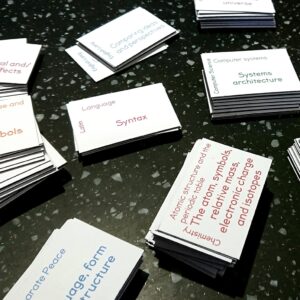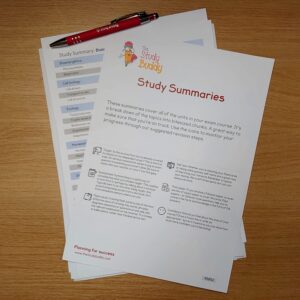

Erm, are you busy right now?
The idea someone could be starting their revision “early” for their GCSE or A-Level exams is a nonsense. The only time you can’t revise is before you’ve learnt something! After that, it’s all fair game.
And the sooner you start, the easier it will be to call on all the knowledge you need to do your best.
Getting your head down and recapping what’s been taught at school is not the preserve of swots, it is a great habit to get into that will save time and pressure further down the line.
The prevailing wisdom is that revision is a concerted effort in a period of time before an exam or test. This isn’t revision. This is cramming, more or less.
You’re trying to get as much into your head in the hope that it is close enough to the surface, fresh enough in your memory, that you’ll be able to pull it out of the bag on the day.
“I’ve got loads of time. The test isn’t ‘til next week.”
The annoying thing is that cramming works. To an extent. But there are pitfalls, and that’s why the apparent effectiveness is misleading.
So if an eleventh-hour spurt of activity isn’t the answer, what is? Well, simply put: little and often. The idea is called Spaced Learning. It works by spacing study over periods of time to create really strong recall. It’s a really easy concept to grasp: we forget what we’ve learnt over time. However, studies have shown that revisiting that information over regular, spaced intervals will help our chances of recall.

When we learn something for the first time, we forget it quickly (this is a bit of a simplification and it doesn’t apply to all new learning). The best advice is then to revisit it quickly afterwards. For example, a couple of days after the lesson, write up some flashcards. This will already have a dramatic effect on the rate of forgetting.
After a few more days, a second reminder is used to further boost memory and recall chances. The graph shows this would be about 10 days after the initial learning. This is a great opportunity to revisit the flashcards with a bit of retrieval practice. It is worth pulling out the information that is not coming so readily. And revisit more frequently. If you didn’t recall it at day 10, you’ll probably really struggle at day 30.
A third revision session is around 3 weeks later, again using retrieval to really challenge the grey cells. Here we could be looking at a touch more with the flashcards. Perhaps some online quizzes too.
A fourth might then be a month later with similar retrieval exercises.
You can see that each time the spacing gets a bit longer. The basis for the spacing is at the point you’re starting to forget. It might be that for certain topics the spacing could be longer while for others it could be much shorter. There are a number of factors that will affect this such as your interest in the subject, how alert you were in the earlier sessions and, of course, the method of study used (highlighting weak, flashcards strong!)
The Study Buddy sets are ideally geared to structuring revision in this way. We’ve already broken down all the subjects into bite-sized units of work. Students can plan their studies around these spaced intervals. Together with the Study Summaries it’s the perfect pairing to keep you on track for your exams in the summer.





Our GCSE and A Level bundles contain everything you need to manage revision, straight out of the box. All tailored to the exact courses you need.